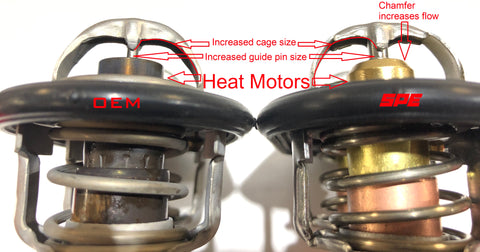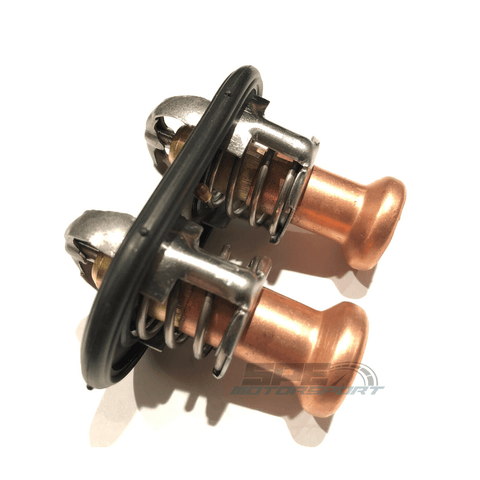Your Cart is Empty
FREE SHIPPING TO USA!*exclusions apply
FREE SHIPPING TO USA!*exclusions apply

The OEM thermostat operates as a 2-in-1 thermostat. The temperature of the OEM thermostat opens at 194°F and 201°F. While this is a factory standard for most applications it is not ideal for the 6.7L Powerstroke platform. SPE’s own concerns as well as customers’ concerns of high fluid temps pushed for research and development for a solution to the problem.
The 6.7L Powerstroke’s primary cooling system is used to cool the oil and transmission* fluid. This was the main consideration for the R&D of this product. The main problem that was found during testing is that the primary coolant temperature is too high. Being that it directly affects your oil and transmission* temperatures, this causes a problem. This is an issue because once the vehicle is at operating temp your oil temperatures are at 200°F and continue to climb. They cannot go below your coolant temperature since you are using the coolant to cool it and oils being cooled by water via a heat exchanger under normal operation will be a minimum of 10°F higher than the base water temp.
Being that oil is thicker than water and flows differently it is common for the temperature of the oil to rise well beyond a 10°F difference under moderate driving conditions. The problem with using the coolant system to cool the oil is it will normally take longer to bring it back to optimal temperatures especially when it’s cooled from a base temperature of 200°F via water. To paraphrase, your base coolant temperature is the driving factor to all other fluid temperatures and their control.
During the SPE R&D phase we tested under moderate and severe driving conditions like most trucks are used. It was not uncommon to see engine oil and transmission temps rise to 250°F or more on newer trucks. Since 260°F oil starts to degrade quickly this can be extremely unsettling. Once lighter driving conditions were resumed temps would come back into check around 210-220°F. This is fine, but 240+°F is not ok. When your engine and transmission are being stressed fluid becomes thin and breaks down quicker. This hinders fluid life and physical part life. Normally, this will lead many customers to do a costly external cooler for the engine oil and transmission which sometimes doesn't even help. It can actually hurt more than help especially when in cooler climates. Because an external oil cooler is open to the atmosphere, it will make it harder to get oil up to running temperature without adding another external thermostat in the oil lines. This adds even more cost and complexity.
We have taken into account the temp rise percentages during many different driving conditions and have calculated a solution without a costly expense to the customer. The first thought would be to make an extremely cold thermostat but this can also have adverse effects. It's not really bad to have lower coolant temps (within reason) but it can be bad for oil when that system is used to control it. Oil must reach a minimum of 175-180°F to remove deposits and moisture by off-gassing. We have dialed in our thermostat to work off of this logic while providing the percentage of head room needed to cool oil fluids when operating under severe conditions. We have also found gains to be had in the flow aspect of the thermostat as well.

The OEM unit is restrictive and slower responding because of it. We found when the factory unit would open it would have a non-desirable delay in temperature drop. We redesigned the cage to be less restrictive. We also changed the design of the heat motor/charge cylinder that actuates the thermostat. These are located in the center of the cage, in turn the coolant flows around them. The OEM heat motors/ charge cylinders have a square edge. The SPE heat motors are chamfered allowing for better flow. This proved to be very effective in helping the coolant temp drop delay. The center guide pin/rod for the heater motor was also increased to help stability and allow better control. The inner seal material on the SPE thermostat is also upgraded silicone based rubber for added longevity over the factory epdm type rubber.
On the 17+ models we found the transmission power holding capability and clutch longevity to be increased as well with the cooler transmission operating temps. During the testing of the 6r140 we were able to control the conditions it was put through at different temp levels. At higher temp levels clutch slip was much easier to achieve and had noticeable wear when disassembled. At lower temp levels under the same conditions slip was drastically reduced and wear was much less evident during inspection.
Overall the SPE engineering team has created a great fix for a bad problem. This cost effective solution is designed to utilize the factory components (cooling system, oil cooler, and transmission cooler) to their fullest potential, optimizing your truck so it can function the way it needs to and last longer than it would in factory trim.
|
NORMAL |
MODERATE |
SEVERE |
|
|
OEM Thermostat Temp 194-201°F |
200-210 °F |
220-235 °F |
240-260 °F |
|
SPE Thermostat Temp 175/180°F |
180-188 °F |
190-210 °F |
215-235 °F |
This chart is based on averages over a range of data. Results may vary.
I have had the thermostat for over a year and have seen nothing but improvement. regen has not been affected.
I purchase a new 17 f350 dually and this is my first diesel. We are retired and got a 43 foot toy hauler to go to AZ. in the winter. This will be the first trip this winter with the truck and fifth wheel. I did purchase a mishimoto low thermostat. Now, you have one much lower. I don’t have time to change it now. But, I don’t understand why the mishimoto only drops 5 deg. and yours is so much more. I didn’t know about your thermostat because I didn’t look. I hope I didn’t make a big mistake.
How does this compare to Mishimoto MMTS-F2D-11L?
As others have asked, how do these thermostats affect soot levels and regen cycles due to the lower temps?
How does the SPE low temp thermostat effect normal regeneration cycles on an emissions compliant F550 cab/ chassis 6.7 PowerStroke ?
Have yall had any downshifting problems after thermostat installs?
I just purchased the thermostat. My 2017 F250 6.7 powerstroke gets pretty hot in my opinion. My thermostat doesn’t open until the temp hits 206
I really hope this will cool down my temps.
Will this work on a 2014 6.7? Thank you
Are the temps close to a 17+ when this tstat is installed on a 11-16?!
HOW DOES THIS AFFECT DPF REGEN
Any daily drive ezlynk graphs available? Lots of bot reviews..
Comments will be approved before showing up.

Jeffrey Draper
January 11, 2022
I installed the SPE LOW TEMP, HIGH FLOW THERMOSTAT on my 2013 f350 6.7l Powerstroke and I am extremely pleased. Normal driving the Coolant temp is 172deg, Engine oil temp is 180-185deg, Trans temp 180-190deg. I pulled a 11,000 trailer up over a 12,500’ pass in Colorado driving 55-65mph. Engine temp got up to 220deg, Engine oil was 231deg and trans temp was 235deg. Once cresting the pass the temps dropped back down to prior temps. Awesome product. Great for extending oil life of engine and transmission.